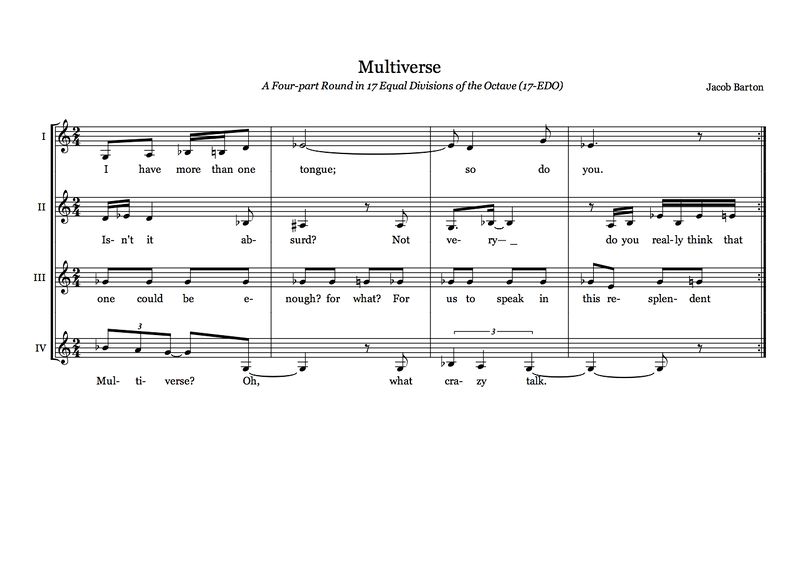Multiverse: Difference between revisions
Wikispaces>FREEZE No edit summary |
Style and categories |
||
| (One intermediate revision by one other user not shown) | |||
| Line 1: | Line 1: | ||
'''''Multiverse''''' is a four-part {{w|Round (music)|round}} in [[17edo]] by [[Jacob Barton]]. | |||
== Why a round? == | |||
In | In Jacob's microtonal journeying, he finds composing and performing rounds useful in a few ways: | ||
* Rounds have a built-in repeat, which means less starting and stopping in the course of rehearsing | |||
* Rounds require multiple people or groups, standing on their own in counterpoint, which means every round is yet another opportunity to need your friends | |||
* Rounds are "not-yet-music" – they have flexible instrumentation and form, which means more creative decisions to be made by the performing group in the course of rehearsing | |||
* Rounds enable adventures in paradoxical listening – multiple instances of a single melody gradually unfold a counterpoint, then a harmony | |||
* Rounds enable collaboration between different levels of musicianship. | |||
== Why 17? == | |||
This round is born of looking at what two systems – 17edo and [[just intonation]] – do to each other. 17edo becomes a way of looking at just intonation, and vice versa. The harmony of this round is based on an understanding of the 6:7:9:11 [[tetrad]] (degrees 0-4-10-15 of 17edo, measure 1), which he sometimes call the "train whistle" [[chord]]. | |||
This round is born of looking at what two systems | |||
Fun fact: This round was written as a preliminary exercise for The Elitism Rumba. | Fun fact: This round was written as a preliminary exercise for The Elitism Rumba. | ||
Visit [[ | Visit [[SeventeenTheory]] for information about the notation used below. There are other ways to notate this. | ||
== Score == | |||
[[File:multiverse.jpg|alt=multiverse.jpg|800x565px|multiverse.jpg]] | [[File:multiverse.jpg|alt=multiverse.jpg|800x565px|multiverse.jpg]] | ||
Also in PDF:[[:File:multiverse.pdf|multiverse.pdf]] | Also in PDF: [[:File:multiverse.pdf|multiverse.pdf]] | ||
== Recordings == | |||
[http://www.soundclick.com/bands/page_songInfo.cfm?bandID=145852&songID=6014186 Old basic version] | |||
Newer, orchestrated minus-one version: | Newer, orchestrated minus-one version: | ||
[[File:multiverse_jmx.mp3]] | |||
== Translations == | |||
Ideally, this would be sung in multiple languages. French, Korean, Estonian translations forthcoming. | Ideally, this would be sung in multiple languages. French, Korean, Estonian translations forthcoming. | ||
[[Category: | |||
[[Category:17edo tracks]] | |||
[[Category:Jacob Barton tracks]] | |||
Latest revision as of 13:39, 31 January 2024
Multiverse is a four-part round in 17edo by Jacob Barton.
Why a round?
In Jacob's microtonal journeying, he finds composing and performing rounds useful in a few ways:
- Rounds have a built-in repeat, which means less starting and stopping in the course of rehearsing
- Rounds require multiple people or groups, standing on their own in counterpoint, which means every round is yet another opportunity to need your friends
- Rounds are "not-yet-music" – they have flexible instrumentation and form, which means more creative decisions to be made by the performing group in the course of rehearsing
- Rounds enable adventures in paradoxical listening – multiple instances of a single melody gradually unfold a counterpoint, then a harmony
- Rounds enable collaboration between different levels of musicianship.
Why 17?
This round is born of looking at what two systems – 17edo and just intonation – do to each other. 17edo becomes a way of looking at just intonation, and vice versa. The harmony of this round is based on an understanding of the 6:7:9:11 tetrad (degrees 0-4-10-15 of 17edo, measure 1), which he sometimes call the "train whistle" chord.
Fun fact: This round was written as a preliminary exercise for The Elitism Rumba.
Visit SeventeenTheory for information about the notation used below. There are other ways to notate this.
Score
Also in PDF: multiverse.pdf
Recordings
Newer, orchestrated minus-one version:
Translations
Ideally, this would be sung in multiple languages. French, Korean, Estonian translations forthcoming.
